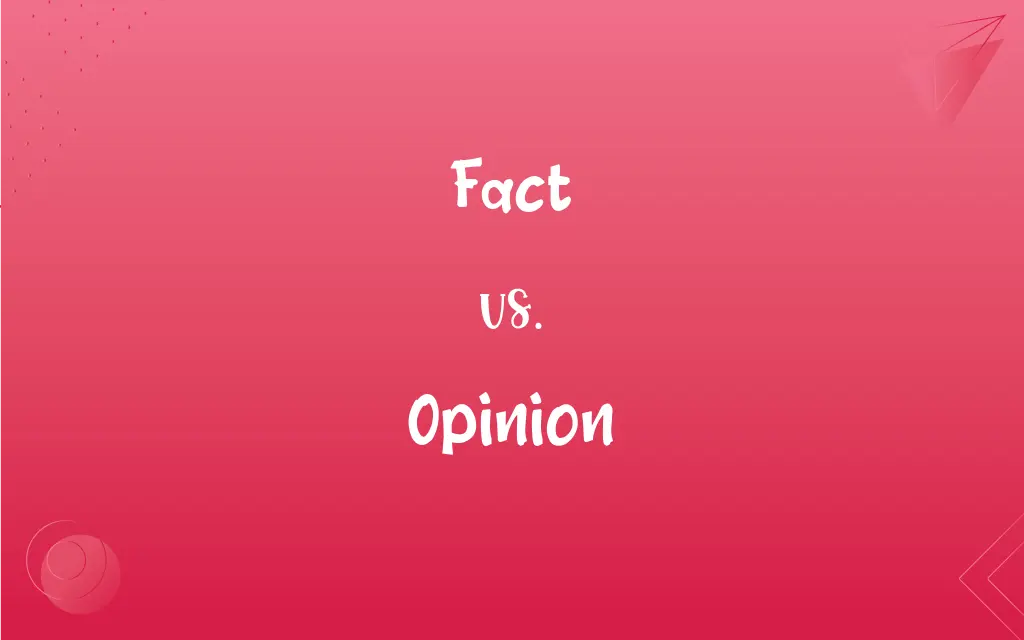Fact vs. Opinion: What's the Difference?
Edited by Aimie Carlson || By Harlon Moss || Updated on October 19, 2023
A fact is a statement that can be proven true or false, while an opinion is a belief or assessment based on personal feelings or interpretations.

Key Differences
A fact is an objective reality or truth that can be verified through evidence or empirical means. It exists independently of individual beliefs or perceptions. For example, the statement that water boils at 100°C at sea level under standard conditions is a fact because it can be empirically tested and verified. Facts serve as the foundation for many academic, scientific, and journalistic endeavors, aiming to present information that is accurate and verifiable.
On the other hand, an opinion is a subjective belief, interpretation, or judgment that stems from personal feelings, tastes, or preferences. It cannot be empirically verified in the same way that facts can. For instance, saying "Chocolate ice cream is the best flavor" is an opinion because it is based on individual taste and cannot be objectively proven. Opinions vary from person to person and can be influenced by culture, upbringing, personal experiences, and emotions.
While facts are often considered immutable and constant, it's essential to understand that new information or research can sometimes change what is accepted as fact. For example, scientific understandings evolve over time, leading to revisions in what is considered factual. This adaptability and growth in knowledge demonstrate the ever-evolving nature of empirical research.
Opinions, being deeply personal, can be diverse and varied even when presented with the same set of facts. In many discussions, debates, or arguments, it's crucial to distinguish between what is a fact and what is an opinion to have a productive conversation. Recognizing this difference helps in critical thinking and in understanding the perspectives of others.
Both facts and opinions have value in different contexts. Facts provide a stable foundation for understanding the world and making informed decisions. Opinions, meanwhile, enrich our personal experiences and drive cultural, artistic, and philosophical discourses. It's the interplay between fact and opinion that shapes much of human thought and interaction.
ADVERTISEMENT
Comparison Chart
Nature
Objective and verifiable
Subjective and based on personal beliefs
Verifiability
Can be proven true or false
Cannot be empirically verified
Basis
Evidence, data, or reality
Personal feelings, tastes, or interpretations
Influence on Decision
Facts inform decision-making processes
Opinions can influence preferences and choices
Variability
Generally constant but can change with new evidence
Varies from person to person
ADVERTISEMENT
Fact and Opinion Definitions
Fact
A piece of information presented as having objective reality.
She checked the facts before publishing the article.
Opinion
A formal expression of judgment or advice by an expert.
The doctor gave his opinion on the patient's condition.
Fact
An actual occurrence or event.
It's a fact that he arrived late to the meeting.
Opinion
The general feeling or judgment of the public.
Public opinion was against the new policy.
Fact
The quality of being real or actual.
The fact of the matter is that they lost the game.
Opinion
A viewpoint formed without direct evidence.
She gave her opinion on the matter, even though she wasn't an expert.
Fact
Something known to exist or to have happened.
The museum displayed artifacts and facts about ancient civilizations.
Opinion
A personal belief or judgment not founded on proof or certainty.
In my opinion, that's the best movie of the year.
Fact
A statement that can be proven to be true or false.
The Earth orbits the Sun.
Opinion
A belief stronger than impression but less strong than positive knowledge.
It's his opinion that the law should be changed.
Fact
Knowledge or information based on real occurrences
An account based on fact.
A blur of fact and fancy.
Opinion
A belief or conclusion held with confidence but not substantiated by positive knowledge or proof
"The world is not run by thought, nor by imagination, but by opinion" (Elizabeth Drew).
Fact
Something demonstrated to exist or known to have existed
Genetic engineering is now a fact. That Chaucer was a real person is an undisputed fact.
Opinion
A judgment based on special knowledge and given by an expert
A medical opinion.
FAQs
What is a fact?
A fact is a verifiable statement or reality that can be proven true or false.
Are all facts permanent?
While many facts are constant, new evidence or research can sometimes change what is accepted as fact.
What is an opinion?
An opinion is a personal belief or judgment based on feelings or interpretations.
Can opinions be proven?
No, opinions are subjective and cannot be empirically verified.
Do facts influence opinions?
Yes, facts can shape or inform opinions, but opinions can also exist independently of facts.
Are all opinions valid?
All opinions are valid as personal beliefs, but not all opinions are informed or based on accurate information.
Can an opinion be harmful?
Yes, opinions based on misinformation or prejudice can be harmful.
Can opinions change over time?
Yes, opinions can evolve based on experiences, new information, or changing beliefs.
Are facts more important than opinions?
Both have value; facts provide an objective foundation, while opinions offer personal perspectives.
Can a fact be an opinion?
No, a fact is objective and verifiable, while an opinion is subjective.
Can everyone have a different opinion on the same topic?
Yes, opinions are personal and can vary widely among individuals.
Is it necessary for an opinion to be informed by facts?
While informed opinions are more robust, it's not mandatory for opinions to be based on facts.
Why is it essential to teach children the difference between fact and opinion?
It fosters critical thinking skills and helps them navigate information and form informed beliefs.
Is it essential to distinguish between fact and opinion?
Yes, distinguishing between them aids in critical thinking and productive discourse.
Can opinions influence facts?
No, facts remain constant regardless of opinions, but how facts are interpreted can be influenced by opinions.
How are facts and opinions used in journalism?
Journalists aim to present facts objectively, but op-ed pieces or editorials express opinions.
Can the same fact lead to different opinions?
Yes, individuals can interpret or feel differently about the same fact.
Can an opinion be based on incorrect facts?
Yes, opinions can be formed based on misinformation or misunderstandings.
How can one differentiate between fact and opinion in a statement?
Look for verifiability; if it can be proven true or false, it's a fact. If it's based on personal belief or interpretation, it's an opinion.
Can facts be biased?
Facts themselves are neutral, but the presentation or interpretation of facts can be biased.
About Author
Written by
Harlon MossHarlon is a seasoned quality moderator and accomplished content writer for Difference Wiki. An alumnus of the prestigious University of California, he earned his degree in Computer Science. Leveraging his academic background, Harlon brings a meticulous and informed perspective to his work, ensuring content accuracy and excellence.
Edited by
Aimie CarlsonAimie Carlson, holding a master's degree in English literature, is a fervent English language enthusiast. She lends her writing talents to Difference Wiki, a prominent website that specializes in comparisons, offering readers insightful analyses that both captivate and inform.































































